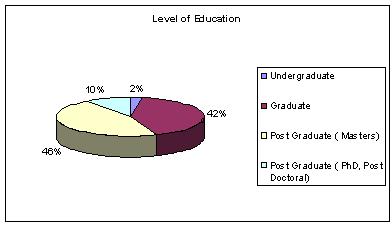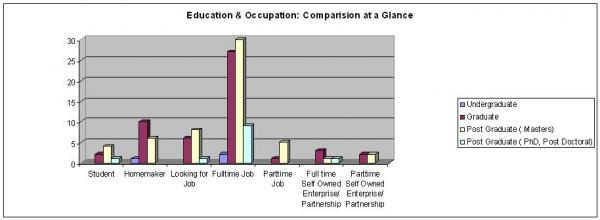Education:
The scenario of women's education in India is undergoing a lot of changes. Education is the fundamental right of every child and equal opportunity for education is the fundamental right of every woman. Keeping in mind the importance of education, all the questions in this section were mandatory in nature. The responses depict an overall image of highly qualified women. Was ‘high educational qualification’ an influencing factor for the rest of the responses to the survey? Let’s find out…

10% women have a PhD degree (includes post doctorate, double post graduation degrees). The percentage of women having graduate and post graduate degrees is almost the same. 2% (three) women have an undergraduate degree and one of them is of non-Indian origin.

Out of three women who have undergraduate degrees, one is a home maker and the other two have full time jobs. Out of all the women who have graduate degrees, 52% have a full time job. Among the women who have double/post graduate degrees, 53% have a full time job.
Out of 12 women who have a PhD degree (post doctorate, double post graduation degrees included), 75% i.e. 9 women have full time jobs, one is looking for a job, one is a full time entrepreneur and one is a student. None of these 12 women are just homemakers nor is anyone working on a part time basis.
We do not have enough detail information to establish a possible co-relation among the respondent’s field of education, designation in current employment, full time/part time jobs, and the choice of a certain field of education due to a higher job opportunity. It was not really our motive to establish this relation. But from the data we received, we can say that most women chose engineering as their field of study. Also, we found that among women of Indian origin, more number of younger women chose technical fields of study as compared to older women.

BAMS: Bachelor of Ayurvedic Medicine & surgery, B Arch: Bachelor of Architecture, BA: Bachelor of Arts, B Com: Bachelor of Commerce, BE: Bachelor of Engineering, BCS: Bachelor of Computer Science, BCA: Bachelor of Computer Application, BTech: Bachelor of Technology, BSc: Bachelor of Science, MBBS: Bachelor of Medicine and Bachelor of Surgery, B Ed: Bachelor of Education, BS: Bachelor of Science, UG: Under Graduate
- While pursuing a course of study in a branch, 65% women could choose the course/subjects according to their liking. 33% women had to choose a particular course due to the prevailing circumstances.
-
Only 2% women chose a particular course under the pressure of parents.
We received some rare responses like “Yes, I opted for Geology because I loved studying life sciences since childhood.”
- Were you able to pursue education as much as you wished?
Here 34% women mentioned that they are still interested in pursuing further studies. 6% women mentioned that they had to discontinue their studies because of the circumstances prevalent at that time. 60% women mentioned that they were able to study according to their wish.
- Did you face gender discrimination with respect to education in your family?
Only 5% women replied affirmatively to this question. Two of them have PhD degrees and the other two have graduate degrees despite facing such discrimination from their families.
In spite of choosing a course according to their liking, 15 women think that they were not able to give enough justice to their education. On the contrary, 40 women think that they have given fair justice to what they learnt.
Out of 31 women who chose a particular course due to the circumstances prevalent at that time, 15 women think that they have given a fair justice to what they studied and other 15 think that they did not give enough justice to their education. Some women even answered that they honestly do not know whether they have given justice or not.
So we can say that, most of the women who could pursue the course of study according to their liking think that they have given justice to their education.
“I wanted to become a…. 10 years have passed since I became a qualified … and I am working in the same field. I feel satisfied about it. I could practically work on the things I learnt and understood minute details in it. It was a pleasant experience. I even studied law and it is proving to be useful in my work.”
“I am glad that I did not waste my opportunity to learn engineering”
“I am not sure. If ‘justice to education’ means ‘getting a job’ then yes, I did give justice to my education. But along with school education, we learn a lot of things…we learn them from books, successful and efficient people and even from the society. I don’t think I have used that knowledge so far”
“Yes. I studied as much as I wanted to. Then I got married and came here (outside of India). My visa status does not allow me to take a job. I would be happy if I get a job here and thus if my degree proves useful.”
“No. After getting married, I did not get any chance to put my degree to use.”
“I was never discriminated at home with respect to education. But when choosing a major in college, I did not think about molding any specific career out of it or even about earning money in future on the basis of my degree. I used to dislike science and mathematics. I loved languages, so I got myself admitted for arts. Most of the girls of my generation used to choose this option. Today’s generation may find this strange. I like the word ‘focused’ which is often used by them. I never used this word. Now sometimes I feel, why didn’t I think about earning money independently?”
“I am a practicing doctor and have my clinic in a rural area, so I think that my educational degree has really been put to use.”
“Yes, I had to prove myself that I am capable of studying science/engineering. Then I worked in software field. Then I did my masters in chip design and am working in the same field. I could still study more in this field to enhance my skills.”
64% women mentioned that their educational degree and current job are directly related. 15% women mentioned that their current area of work is completely different from their educational degrees. 9% women mentioned that their educational degrees and the current job are related to each other only to some extent. (Here education means a formal degree course) - How did you benefit from your education? As an answer to this question,
- 37% women (45 in number) mentioned that education built self confidence and made them independent.
- An honest reply said that incomplete education proved to be useless. Perhaps she would have been benefited if she had completed her education
- 27% (33) women think that education gave them an ability to think.
- 12 women mentioned that they gained domain knowledge.
- 13 women said that they could identify themselves based on their education.
- 2 women mentioned that their educational degrees helped them find a better groom.
- Another 6 women mentioned that they could make many friends and/or develop networking.
- Other 6 mentioned that they were happy.
- 5 women mentioned that they achieved mental and contemplative balance.
- 9 women mentioned that they developed coping skills and earned decision making power.
We do not have enough data regarding the extent to which factors like educational background in the family, reformist environment at home, economic status etc affect a woman’s education, so a precise analysis could not be done. Yet, here, we would like to mention some responses. Although most women came from an economically sound background, their responses show a consideration towards the fact that their parents/grandparents had to face economic hardships while obtaining education.
“My mother is a commerce graduate. She has been working in a government organization since 33 years. My father is M.com (Master of Commerce), L.L.B (Bachelor of Law) and CA (Chartered Accountant). He completed his education with the financial support that my mother provided through her job. Mother’s job has always been a primary financial support for our family. Because of her support, father could experiment on a lot of things. Mother declined all promotions. My elder brother is a mechanical engineer. My grandmother, I think, must have completed her 7th or 10th grade education. At the age of 93, she is still active in reading and writing...”
“My grandfather was a brilliant person is all I know about him. He was a principal at a school. He passed away before my mother was born, so I do not know anything about his exact educational qualification...”
“My Mom was an M.A, M.Phil (Sanskrit) and a Professor of Sanskrit. My father is an M.Com and ICWA. He retired as a Finance Vice President from a giant firm. Grandmother #1: Her father was a freedom fighter so my grandmother was not enrolled in a British school but a teacher used to come home to teach her. Thus she completed her education (equivalent to Matriculation). Grandfather #1: He was double M.A and PhD. He retired as a HOD of a language department in a college. Grandmother #2: She completed her incomplete matriculation along with my mother. Grandfather #2: Engineering diploma from VJTI (At that time degree course was not offered at VJTI)
Grandparents - Uneducated, Mother - 10th Grade Pass, Father – Graduate
Father: Matriculate. He could not complete his further studies because of financial problems. Mother: B.A. Both parents are retired after serving government authorities.
All siblings at least have a graduate degree.
Mother: Passed 7th grade Father: Graduate Degree. Grandmother: Passed 4th grade, 1 brother, 3 sisters: Graduate Grandfather: Illiterate, Sister-in-law: Passed her matriculation, Husband: PhD, Mother-in-law: Illiterate, Father-in-law: Graduate, 2 brothers-in-law: both are graduate, 2 sisters-in-law: One of them has passed 12th grade, other one is illiterate. Mom: Passed 9th grade, Father: Passed 7th grade
As mentioned at the beginning, we could sketch an image of women who
- are highly qualified
- mostly did not face any kind of discrimination with respect to education
- mostly were able to choose the course of the study according to their liking
- think that they have given enough justice to their education
- still wish to study further.
- have a full time job irrespective of their educational level
In the next part, we will talk about the designation and equal opportunities in the careers of the respondents.
